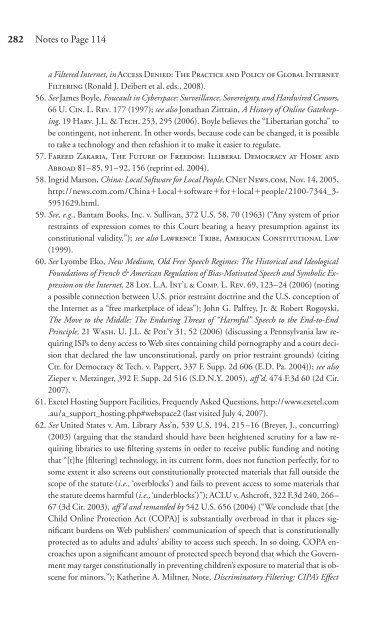Download - Future of the Internet â And how to stop it.
Download - Future of the Internet â And how to stop it.
Download - Future of the Internet â And how to stop it.
You also want an ePaper? Increase the reach of your titles
YUMPU automatically turns print PDFs into web optimized ePapers that Google loves.
282<br />
Notes <strong>to</strong> Page 114<br />
a Filtered <strong>Internet</strong>, in ACCESS DENIED: THE PRACTICE AND POLICY OF GLOBAL INTERNET<br />
FILTERING (Ronald J. Deibert et al. eds., 2008).<br />
56. See James Boyle, Foucault in Cyberspace: Surveillance, Sovereignty, and Hardwired Censors,<br />
66 U. CIN. L. REV. 177 (1997); see also Jonathan Z<strong>it</strong>train, A His<strong>to</strong>ry <strong>of</strong> Online Gatekeeping,<br />
19 HARV. J.L. & TECH. 253, 295 (2006). Boyle believes <strong>the</strong> “Libertarian gotcha” <strong>to</strong><br />
be contingent, not inherent. In o<strong>the</strong>r words, because code can be changed, <strong>it</strong> is possible<br />
<strong>to</strong> take a technology and <strong>the</strong>n refashion <strong>it</strong> <strong>to</strong> make <strong>it</strong> easier <strong>to</strong> regulate.<br />
57. FAREED ZAKARIA, THE FUTURE OF FREEDOM: ILLIBERAL DEMOCRACY AT HOME AND<br />
ABROAD 81–85, 91–92, 156 (reprint ed. 2004).<br />
58. Ingrid Marson, China: Local S<strong>of</strong>tware for Local People, CNET NEWS.COM, Nov. 14, 2005,<br />
http://news.com.com/ChinaLocals<strong>of</strong>twareforlocalpeople/2100-7344_3-<br />
5951629.html.<br />
59. See, e.g., Bantam Books, Inc. v. Sullivan, 372 U.S. 58, 70 (1963) (“Any system <strong>of</strong> prior<br />
restraints <strong>of</strong> expression comes <strong>to</strong> this Court bearing a heavy presumption against <strong>it</strong>s<br />
const<strong>it</strong>utional valid<strong>it</strong>y.”); see also LAWRENCE TRIBE, AMERICAN CONSTITUTIONAL LAW<br />
(1999).<br />
60. See Lyombe Eko, New Medium, Old Free Speech Regimes: The His<strong>to</strong>rical and Ideological<br />
Foundations <strong>of</strong> French & American Regulation <strong>of</strong> Bias-Motivated Speech and Symbolic Expression<br />
on <strong>the</strong> <strong>Internet</strong>, 28 LOY. L.A. INT’L & COMP. L. REV. 69, 123–24 (2006) (noting<br />
a possible connection between U.S. prior restraint doctrine and <strong>the</strong> U.S. conception <strong>of</strong><br />
<strong>the</strong> <strong>Internet</strong> as a “free marketplace <strong>of</strong> ideas”); John G. Palfrey, Jr. & Robert Rogoyski,<br />
The Move <strong>to</strong> <strong>the</strong> Middle: The Enduring Threat <strong>of</strong> “Harmful” Speech <strong>to</strong> <strong>the</strong> End-<strong>to</strong>-End<br />
Principle, 21 WASH. U. J.L. & POL’Y 31, 52 (2006) (discussing a Pennsylvania law requiring<br />
ISPs <strong>to</strong> deny access <strong>to</strong> Web s<strong>it</strong>es containing child pornography and a court decision<br />
that declared <strong>the</strong> law unconst<strong>it</strong>utional, partly on prior restraint grounds) (c<strong>it</strong>ing<br />
Ctr. for Democracy & Tech. v. Pappert, 337 F. Supp. 2d 606 (E.D. Pa. 2004)); see also<br />
Zieper v. Metzinger, 392 F. Supp. 2d 516 (S.D.N.Y. 2005), aff’d, 474 F.3d 60 (2d Cir.<br />
2007).<br />
61. Exetel Hosting Support Facil<strong>it</strong>ies, Frequently Asked Questions, http://www.exetel.com<br />
.au/a_support_hosting.php#webspace2 (last vis<strong>it</strong>ed July 4, 2007).<br />
62. See Un<strong>it</strong>ed States v. Am. Library Ass’n, 539 U.S. 194, 215–16 (Breyer, J., concurring)<br />
(2003) (arguing that <strong>the</strong> standard should have been heightened scrutiny for a law requiring<br />
libraries <strong>to</strong> use filtering systems in order <strong>to</strong> receive public funding and noting<br />
that “[t]he [filtering] technology, in <strong>it</strong>s current form, does not function perfectly, for <strong>to</strong><br />
some extent <strong>it</strong> also screens out const<strong>it</strong>utionally protected materials that fall outside <strong>the</strong><br />
scope <strong>of</strong> <strong>the</strong> statute (i.e., ‘overblocks’) and fails <strong>to</strong> prevent access <strong>to</strong> some materials that<br />
<strong>the</strong> statute deems harmful (i.e., ‘underblocks’)”); ACLU v. Ashcr<strong>of</strong>t, 322 F.3d 240, 266–<br />
67 (3d Cir. 2003), aff’d and remanded by 542 U.S. 656 (2004) (“We conclude that [<strong>the</strong><br />
Child Online Protection Act (COPA)] is substantially overbroad in that <strong>it</strong> places significant<br />
burdens on Web publishers’ communication <strong>of</strong> speech that is const<strong>it</strong>utionally<br />
protected as <strong>to</strong> adults and adults’ abil<strong>it</strong>y <strong>to</strong> access such speech. In so doing, COPA encroaches<br />
upon a significant amount <strong>of</strong> protected speech beyond that which <strong>the</strong> Government<br />
may target const<strong>it</strong>utionally in preventing children’s exposure <strong>to</strong> material that is obscene<br />
for minors.”); Ka<strong>the</strong>rine A. Miltner, Note, Discrimina<strong>to</strong>ry Filtering: CIPA’s Effect


